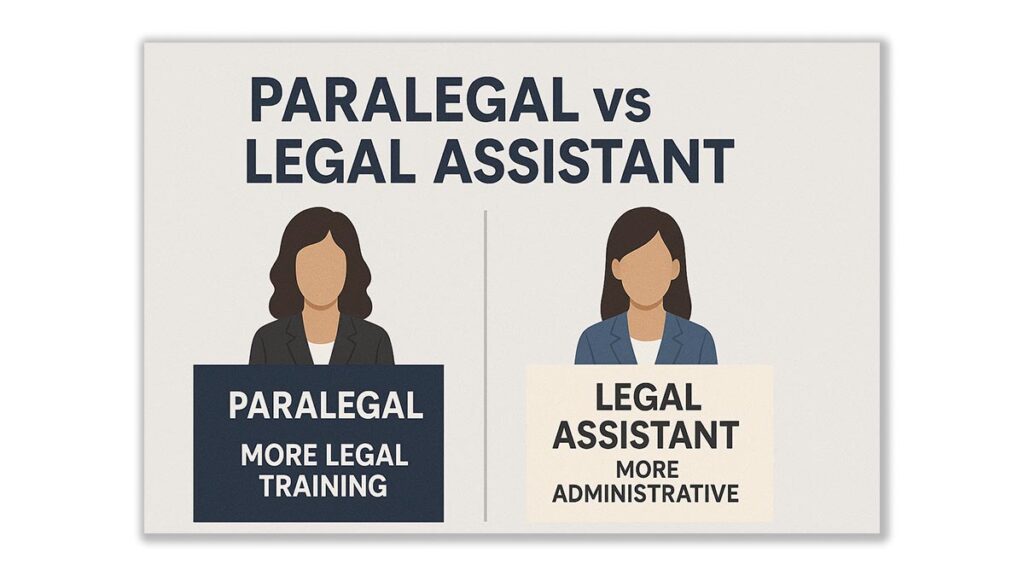Understanding what is the difference between a paralegal and legal assistant is essential for those seeking legal support or pursuing a career in the legal field. While these roles are often used interchangeably, they have distinct responsibilities, skill sets, and qualifications. This article provides an in-depth exploration of these differences and explains how law firms can benefit from employing both professionals.

Defining the Roles: Paralegal and Legal Assistant
The terms paralegal and legal assistant are frequently used synonymously, but they represent different roles in the legal industry. Both positions provide crucial support to attorneys, yet their responsibilities and qualifications vary.
- Paralegal: A paralegal is a trained professional who assists attorneys with substantive legal work, including case law research, drafting legal documents, and preparing for trials. They often specialize in specific legal areas such as corporate law, family law, or litigation.
- Legal Assistant: A legal assistant typically performs administrative duties to support a law firm’s operations. These tasks include managing schedules, handling correspondence, organizing case files, and ensuring the office runs smoothly.

What Is the Difference Between a Paralegal and Legal Assistant?
Nature of Work
- Paralegal: Engages in tasks that require legal knowledge and expertise, such as conducting legal research, preparing case summaries, and drafting pleadings. Paralegals work closely with attorneys to support case strategy and ensure legal compliance.
- Legal Assistant: Focuses on administrative tasks like scheduling court dates, managing client communications, and maintaining organizational efficiency. Their role ensures that attorneys and paralegals can focus on case-related responsibilities.
Educational Requirements
- Paralegal: Requires formal education, such as a certificate, associate degree, or bachelor’s degree in paralegal studies. Some paralegals also obtain certification from organizations like NALA (National Association of Legal Assistants).
- Legal Assistant: Typically requires a high school diploma or associate degree. Legal assistants rely more on administrative skills than specialized legal knowledge.
Legal Authority
- Paralegal: Works on substantive legal tasks under attorney supervision but cannot provide legal advice, represent clients in court, or sign legal documents.
- Legal Assistant: Does not perform substantive legal tasks but supports the overall function of the legal team through organizational and clerical duties.
Why Understanding the Difference Matters between a paralegal and legal assistant?

Understanding what is the difference between a paralegal and legal assistant is crucial for both law firms and clients. Law firms can assign tasks more efficiently by leveraging each role’s unique strengths, while clients can better understand how their cases are managed.
For example, paralegals are ideal for detailed legal work that requires precision and understanding of legal processes, while legal assistants ensure the smooth day-to-day operation of the firm. Employing both roles allows law firms to operate at maximum efficiency and deliver better client outcomes.
Benefits of Employing Both Roles in a Law Firm
- Enhanced Productivity
Paralegals and legal assistants work collaboratively to streamline workflows. Paralegals handle case-specific tasks, while legal assistants manage administrative duties, creating a balanced and efficient legal team. - Cost-Effective Solutions
Assigning tasks appropriately reduces costs. Paralegals, whose expertise commands higher pay, focus on substantive legal work, while legal assistants handle administrative duties at a lower cost. - Improved Client Experience
With both roles in place, clients receive comprehensive support. Paralegals provide substantive legal assistance, while legal assistants maintain seamless communication and coordination.
Ensure your intake team identifies high-quality cases from the start. Schedule a consultation to learn how Regentsrs can help your firm!

How Regentsrs Enhances Legal Support with Trained Professionals
At Regentsrs, we understand the importance of having both paralegals and legal assistants in a legal team. We provide access to highly skilled professionals trained to deliver top-tier support tailored to your firm’s needs. Whether you require paralegals for specialized legal tasks or legal assistants for administrative excellence, Regentsrs offers solutions that enhance efficiency and client satisfaction.
Need highly skilled legal support for your law firm? Get in touch with us to discuss your firm’s unique needs!
Understanding what is the difference between a paralegal and legal assistant allows law firms to optimize their operations and deliver superior client service. By leveraging the unique strengths of each role, firms can improve efficiency, reduce costs, and enhance client satisfaction. Next, learn how virtual paralegal services are transforming the legal industry with flexible and cost-effective solutions.


